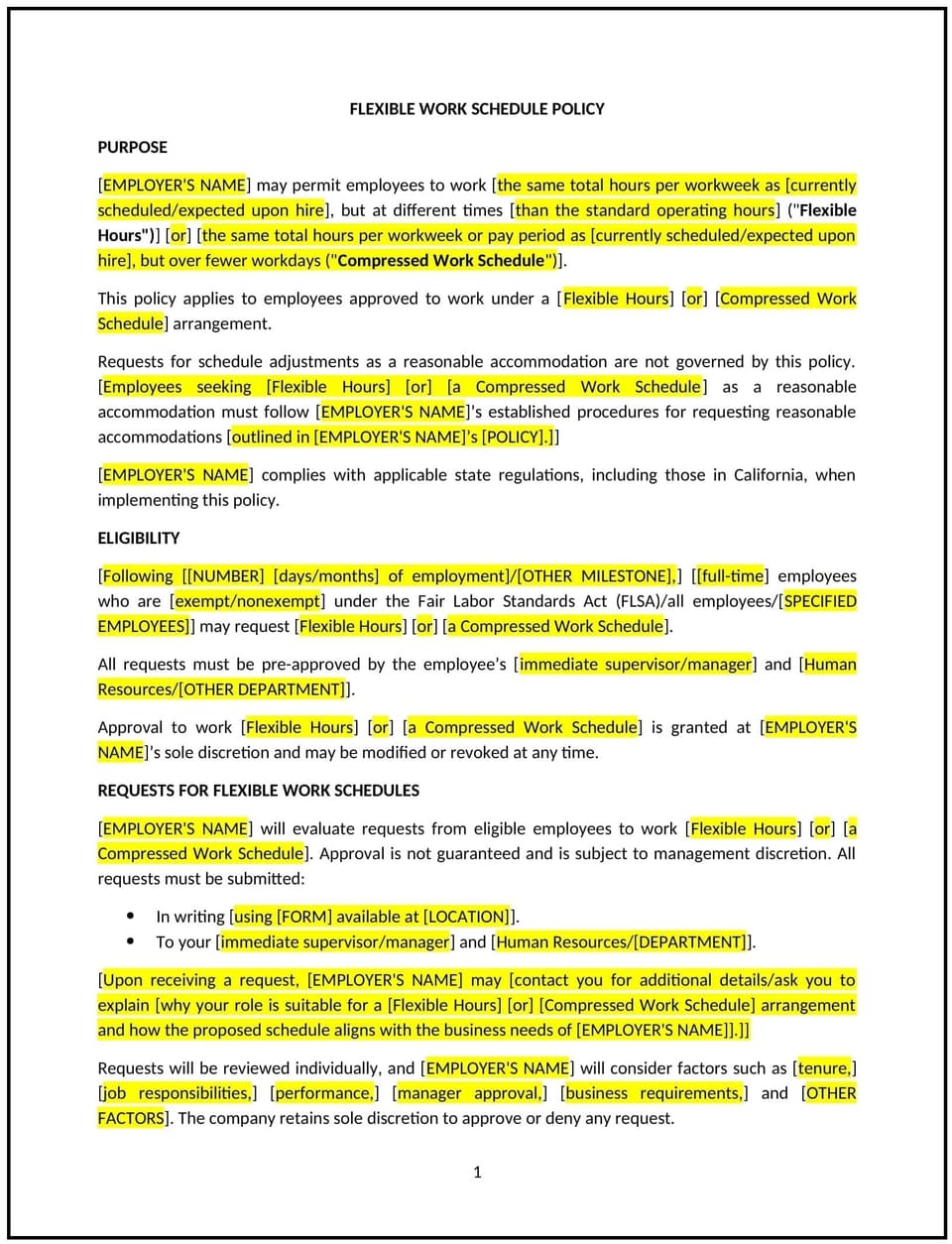Flexible work schedule policy (California): Free template

Flexible work schedule policy (California)
In California, a flexible work schedule policy provides businesses with guidelines for offering employees alternative work arrangements, such as adjusted start and end times, compressed workweeks, or remote work options. This policy supports compliance with California labor laws, including wage and hour requirements under the California Labor Code.
This policy outlines eligibility criteria, procedures for requesting flexible schedules, and the business’s expectations for maintaining productivity and communication. By implementing this policy, California businesses can enhance employee satisfaction while managing operational needs effectively.
How to use this flexible work schedule policy (California)
- Define eligibility: Specify which roles or employees qualify for flexible work arrangements based on job responsibilities and business needs.
- Outline scheduling options: Provide examples of flexible arrangements, such as flextime, compressed workweeks, or telecommuting.
- Establish request procedures: Detail how employees can request flexible schedules, including required notice and approval processes.
- Address compliance: Ensure that flexible arrangements adhere to California wage and hour laws, including overtime and meal/rest break requirements.
- Monitor performance: Set expectations for maintaining productivity, availability, and communication under flexible work schedules.
Benefits of using this flexible work schedule policy (California)
This policy offers several advantages for California businesses:
- Supports compliance: Reflects California labor laws, including overtime, break, and wage requirements for flexible schedules.
- Promotes work-life balance: Enhances employee morale and retention by accommodating personal and professional needs.
- Increases productivity: Allows employees to work during their most productive hours, benefiting the business and the individual.
- Reduces absenteeism: Provides flexibility that helps employees manage personal obligations without missing work.
- Improves recruitment: Attracts talent by demonstrating the business’s commitment to modern, employee-friendly work arrangements.
Tips for using this flexible work schedule policy (California)
- Address California-specific laws: Ensure compliance with overtime rules, meal/rest break requirements, and alternative workweek approvals under state law.
- Train managers: Educate supervisors on handling flexible schedule requests fairly and consistently while maintaining compliance.
- Use performance metrics: Implement tools to measure productivity and accountability for employees with flexible arrangements.
- Communicate expectations: Provide clear guidelines for availability, task completion, and communication to prevent misunderstandings.
- Review regularly: Update the policy to reflect changes in California laws, workplace technology, or business needs.
Q: How does this policy benefit the business?
A: This policy supports compliance with California labor laws, enhances employee satisfaction, and improves productivity through flexible work arrangements.
Q: What types of flexible work schedules are allowed under this policy?
A: Examples include adjusted start and end times, compressed workweeks, and remote work arrangements, depending on the role and business needs.
Q: How does this policy support compliance with California laws?
A: The policy reflects California labor regulations, including wage and hour requirements, ensuring lawful implementation of flexible schedules.
Q: What steps should employees take to request a flexible work schedule?
A: Employees should submit a formal request to their manager or HR, outlining the proposed schedule and how it aligns with job responsibilities.
Q: How can the business ensure productivity under flexible schedules?
A: The business can set clear expectations, use performance metrics, and maintain open communication to monitor and support productivity.
This article contains general legal information and does not contain legal advice. Cobrief is not a law firm or a substitute for an attorney or law firm. The law is complex and changes often. For legal advice, please ask a lawyer.


